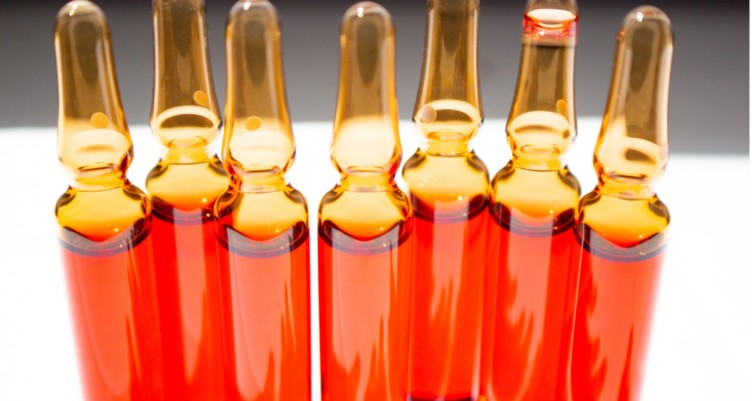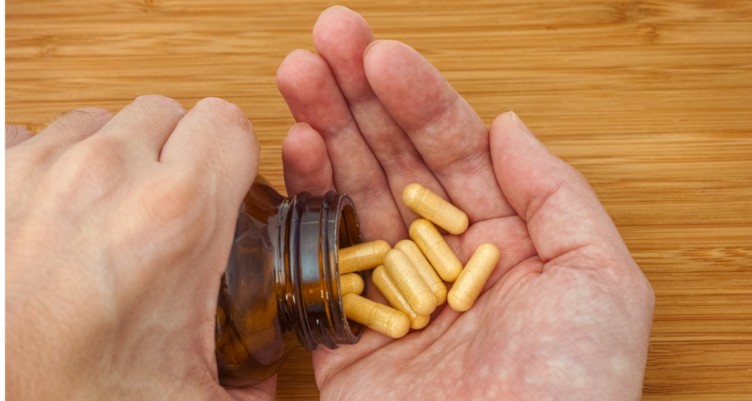B12 Deficiency: Signs, Symptoms and Treatment

- Vitamin B12 is a water-soluble vitamin that plays an important role in brain and nerve health.
- B12 deficiency symptoms can range from mild fatigue and weakness to more severe issues like depression and dementia, if left untreated.
- Eating foods that are high in B12, taking supplements and even getting injections can help provide your body with the B12 you need to thrive.
From helping make red blood cells to protecting your nervous system, vitamin B12 plays a critical role in keeping your body healthy and strong. That’s why a B12 deficiency can throw your body into chaos, causing big problems that range from general fatigue to memory loss.
Certain people—including vegetarians and those with medical conditions like Crohn’s disease— are more susceptible to B12 deficiency, but getting enough B12 is important no matter who you are. Read on to learn more about this vital nutrient—and the signs and symptoms to look out for that may signal you’re not getting enough.
What is vitamin B12?

You may have noticed vitamin B12 listed on the label of your multivitamin. But what is it, exactly? B12 is one of the eight B vitamins—also known as B complex vitamins—that your body needs to function, along with thiamine, riboflavin, niacin, pantothenic acid, pyridoxine, biotin and folate. You may sometimes hear B12 referred to as cobalamin, too.
B12, along with the rest of the B vitamins, is water-soluble, meaning it dissolves in water. Why does this matter? Our body’s tissues can easily and readily absorb water-soluble vitamins (which is a good thing!), but they don’t hold onto excess vitamins for future use.
Instead, our body gets rid of the extra via urine. This means that we need to replenish our levels of vitamin B12 and other water-soluble vitamins regularly, often through foods and supplements. (Fat-soluble vitamins, by contrast, dissolve in fats. Our body stores fat-soluble vitamins in its fatty tissues and the liver for future use.)
Related: What is Vitamin K? How This Vitamin Supports Bone and Heart Health
What is vitamin B12 good for?

Like all essential vitamins and minerals, B12 helps keep your body running at peak performance levels.
So, what is vitamin B12 good for? Vitamin B12 helps your body produce red blood cells and DNA, and it helps keep your nervous system operating smoothly.
Scientists also believe that B12 plays a role in affecting your mood. In studies, they’ve found that vitamin B12 can help stave off depression and even improve the effectiveness of antidepressants.[1] It’s also been linked with supporting bone health and helping to prevent osteoporosis.[2]
If you’re pregnant or trying to become pregnant, you should know that researchers believe vitamin B12 may help prevent birth defects, as well as miscarriages and infertility.[3]
In addition, B12 also helps support eye health and can help keep your brain sharp.[4][5]
Related: Benefits of Vitamin D and How to Get More of It
Vitamin B12 deficiency symptoms

A B12 deficiency doesn’t happen overnight. However, over time, you may start to notice some funky symptoms that could be related to a lack of vitamin B12 in your body.
The only way to know for sure is to make an appointment with your physician, discuss your potential B12 deficiency symptoms and then ask her to test your vitamin B12 levels. Make sure to also let your doctor know about any recent dietary or lifestyle changes, too, which can help add more pieces to the diagnostic puzzle.
Some of the most common vitamin B12 deficiency symptoms include:
- Fatigue and weakness: These symptoms are often connected to anemia, a condition in which your body doesn’t have as many healthy red blood cells as it needs to function. Red blood cells carry oxygen to all the different parts of your body, hence why you may feel fatigued and tired when you don’t have enough.
- Trouble focusing or solving problems: Scientists don’t fully understand B12’s impact on the brain, but they have linked B12 deficiency to cognitive issues in research studies.[6]
- Memory loss: Researchers believe that B12 deficiency may be responsible for some types of dementia and memory loss conditions.[7]
- Tongue inflammation: Swelling of the tongue and other oral symptoms may be some of the first warning signs of B12 deficiency.[8]
- Problems with balance: Because of B12’s impact on the nervous system, a deficiency can lead to neurological issues that make it difficult to walk or perform coordinated movements.[9]
- Numbness or tingling in your hands, legs and feet: Feeling like pins and needles are poking your extremities is likely caused by nerve damage, which can result from B12 deficiency.[10]
Vitamin B12 deficiency risk factors

Although it’s something everyone should keep an eye out for, there are certain diet and lifestyle choices (and a few medical issues) that can put you more at risk for developing a B12 deficiency, including:
- Following a vegetarian or vegan diet: Since plants can’t provide your body with B12, if you’re following a strict vegetarian or vegan diet, you may be at increased risk of developing a vitamin B12 deficiency.[11]
- Having celiac or Crohn’s disease: Certain conditions like Crohn’s or celiac disease can prevent your body from absorbing the nutrients it needs, which can lead to B12 deficiency.[12]
- Taking heartburn medications: Medications to relieve heartburn work by reducing your stomach’s acid production levels. But this, in turn, means there isn’t enough stomach acid to absorb B12.[13]
- Getting weight-loss surgery: Some weight-loss surgeries affect your body’s ability to absorb B12.[14]
- Aging: Elderly people are at much higher risk of B12 deficiency than younger people. As our bodies age, our stomachs produce lower levels of stomach acid, which makes it more difficult for our bodies to absorb B12 from foods. Though numbers vary, an estimated 10 to 15 percent of people over the age of 60 suffer from B12 deficiency.[15]
Related: Are You Tired, or Is it Low Magnesium? Signs of Magnesium Deficiency
How to get more B12 in your diet

If you’re wondering how to get more B12 in your diet, don’t worry, you’ve got a variety of options. Researchers believe our bodies can absorb vitamin B12 from sources more efficiently than from others (a concept known as bioavailability), so you’ll want to keep that in mind when you’re weighing one option over another.
Better yet, you may want to consider adding more vitamin B12 to your diet in multiple ways! If you’re looking to up your intake, here are some of the best ways to get more vitamin B12:
- Food (it all starts with diet): You can find B12 in all sorts of different foods, including protein sources like meat and seafood to breakfast cereal to seaweed. If you eat meat, your best bet for adding more B12 to your diet is to eat chicken, mutton and fish, as they all offer high levels of bioavailability of B12. Eggs are less efficient, but can still give you a small B12 boost.[16] Curious about which foods offer the maximum B12 amounts? The next time you’re at the grocery store, pick up some beef liver, clams, tuna and salmon. Yum!
- Drinks (drink your vitamins, too!): To go along with your daily meals and snacks, consider drinking your vitamin B12. Besides being convenient, consuming a B-infused beverage will also help you stay hydrated. So, if you’re open to letting liquids do some of the nutritional work, find something to sip on that features B12!
- Supplements (add it to your daily stack): In addition to focusing on your food and drink choices, taking supplemental vitamins is an easy, foolproof way to ensure you’re getting all the vitamin B12 you need each day. Of course, make sure to check with a medical professional before you add any supplement to your daily stack. In particular, vegans and vegetarians should consider supplementing with this important vitamin since their diets do not contain B12-rich meat or seafood.
- Injections (could be the more extreme route): If you have a serious B12 deficiency, your doctor may prescribe B12 injections in certain cases. These injections are prescribed and administered by physicians into your muscles, and they’re generally super effective at raising your body’s B12 levels. Although medical professionals say there are very few downsides to getting B12 shots, some people may have an allergic reaction.[17]
How much B12 should you take a day?

There’s no one-size-fits-all approach to how much B12 you should take in a day, but there are some recommended guidelines you can follow to get a general idea.
The National Institutes of Health recommends 2.4 micrograms of vitamin B12 a day for adults. The amount that children need each day increases from 0.4 micrograms for newborns up to 2.4 at age 14. Women who are pregnant should strive for 2.6 micrograms per day, while those who are breastfeeding need 2.8 micrograms per day.[18]
The bottom line: If you’re feeling a little off your game and you’re not exactly sure why, make an appointment with your doctor to discuss whether you might have a B12 deficiency. Make a plan for increasing the amount of B12 in your diet, either by chowing down on B12-rich foods, taking supplements or some combination of the ways that work best for you.
Wondering how to beat that daily afternoon slump and keep your brain firing on all cylinders? Learn more about how to support your brain and body with natural energy supplements.
Sign up for early access to sales, product launches, the latest Bulletproof news and more!



